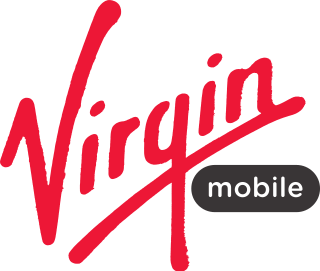Related Research Articles
A SIM lock, simlock, network lock, carrier lock or (master) subsidy lock is a technical restriction built into GSM and CDMA mobile phones by mobile phone manufacturers for use by service providers to restrict the use of these phones to specific countries and/or networks. This is in contrast to a phone that does not impose any SIM restrictions.

Bell Mobility Inc. is a Canadian wireless network operator and the division of Bell Canada which offers wireless services across Canada. It operates networks using LTE and HSPA+ on its mainstream networks. Bell Mobility is the third-largest wireless carrier in Canada, with 10.1 million subscribers as of Q3 2020.

A mobile virtual network operator (MVNO) is a wireless communications services provider that does not own the wireless network infrastructure over which it provides services to its customers. An MVNO enters into a business agreement with a mobile network operator to obtain bulk access to network services at wholesale rates, then sets retail prices independently. An MVNO may use its own customer service, billing support systems, marketing, and sales personnel, or it could employ the services of a mobile virtual network enabler (MVNE).

Virgin Mobile is a wireless communications brand used by seven independent brand-licensees worldwide. Virgin Mobile branded wireless communications services are available in the United Kingdom, Ireland, Canada, Colombia, Chile, Kuwait, Saudi Arabia, United Arab Emirates, Poland and Mexico. Virgin Mobile branded services used to be offered in Australia, France, Singapore, India, Qatar, South Africa and the United States.

Fido Solutions Inc. is a Canadian mobile network operator owned by Rogers Communications. Since its acquisition by Rogers in 2004, it has operated as a Mobile virtual network operator (MVNO) using the Rogers Wireless network.

TracFone Wireless, Inc. (TFWI) was an American wireless service provider. It was a mobile virtual network operator offering prepaid and no-contract service on the AT&T Mobility, T-Mobile US, and Verizon networks under multiple brands, including TracFone, Net10 Wireless, GoSmart Mobile, Page Plus Cellular, SafeLink Wireless, Simple Mobile, Total Wireless, and Straight Talk Wireless.

M1 Limited is a telecommunications company based in Singapore. Founded in 1994, M1 was listed on the Singapore Exchange from 2002 to 2019. The company is a subsidiary of Keppel Ltd.

Cricket Wireless is an American prepaid mobile virtual network operator (MVNO), wholly-owned by AT&T. It provides wireless services to ten million subscribers in the United States. Cricket Wireless was founded in March 1999 by Leap Wireless International. AT&T acquired Leap Wireless International in March 2014, and later merged Cricket Wireless operations with Aio Wireless. Cricket Wireless competes primarily against T-Mobile's Metro by T-Mobile, EchoStar's Boost Mobile and Verizon's Visible in the prepaid wireless segment.
Qwest Wireless LLC was a cellular phone service owned by Qwest Communications and offered in the United States. Qwest Wireless was a mobile virtual network operator (MVNO) that operated on Sprint's CDMA network. While Qwest originally owned its own wireless network, it discontinued that network in 2004 as part of the move to become an MVNO. The network elements were sold to other carriers after shutdown. Qwest was the only Baby Bell that offered its wireless service as an MVNO; since the wireless company used Sprint's network, most of their phones were Sprint phones with the Qwest name on them. Their phones included models from Sanyo, Samsung, Nokia, UT Starcom, HTC, and Motorola. Qwest Wireless ended the year 2007 with 824,000 wireless subscribers.
Mobile ESPN was a mobile virtual network operator (MVNO) run by The Walt Disney Company using Sprint's EVDO wireless network from November 25, 2005, until December 2006. The service was widely considered overpriced and a failure, though in retrospect the actual data and audio-visual backbone and software behind the service would be re-adapted successfully for the smartphone age several years later, untied to a carrier.
Amp'd Mobile was a cellular phone service launched in the United States in late 2005, and in Canada in early 2007. The company was a Mobile Virtual Network Operator offering 3G voice and data services over the Verizon Wireless EV-DO network, including text and picture messaging, push-to-talk, and over-the-air downloadable applications and content from its Amp'd Live service. Its primary non-venture capital investors were MTV Networks and Universal Music Group. The service targeted 18- to 35-year-olds, and was the first integrated mobile entertainment company for youth, young professionals and early adopters, similar to Helio.

Wi-Fi calling, also called VoWiFi, refers to mobile phone voice calls and data that are made over IP networks using Wi-Fi, instead of the cell towers provided by cellular networks. Using this feature, compatible handsets are able to route regular cellular calls through a wireless LAN (Wi-Fi) network with broadband Internet, while seamlessly change connections between the two where necessary. This feature makes use of the Generic Access Network (GAN) protocol, also known as Unlicensed Mobile Access (UMA).

Helio, Inc. is a former, mobile virtual network operator (MVNO) using Sprint's network that offered wireless voice, messaging and data products and services to customers in the continental United States beginning on May 2, 2006. Originally a 50/50 joint venture founded in January, 2005 between South Korean wireless operator SK Telecom and American Internet services provider EarthLink, early losses caused EarthLink to stop providing additional funding in fall of 2007. SK Telecom provided the required additional funding to sustain Helio, which was re-organized as Helio LLC, and by January 2008, SK Telecom had assumed an increased ownership stake and with it, operational control of the joint venture. Although SK Telecom publicly pledged to support Helio, SK Telecom entered into talks to sell the company to rival MVNO Virgin Mobile USA. Virgin Mobile USA closed the acquisition of Helio and its 170,000 subscribers on August 22, 2008. Virgin Mobile USA exited the postpaid wireless business and retired the Helio brand on May 25, 2010.

A mobile phone signal is the signal strength received by a mobile phone from a cellular network. Depending on various factors, such as proximity to a tower, any obstructions such as buildings or trees, etc. this signal strength will vary. Most mobile devices use a set of bars of increasing height to display the approximate strength of this received signal to the mobile phone user. Traditionally five bars are used.

Kroger Wireless LLC is an American mobile virtual network operator providing domestic telecommunications services via the T-Mobile Network. The brand was launched as i-wireless, a Kroger Co. It was trialed in 130 Kroger stores in 2006, before being rolled out by mid-2008 to over 2,200 locations, including banner stores such as Dillons, Ralphs, Fred Meyer, and Fry's Food and Drug. Unique among US wireless operators, i-wireless created a loyalty offer allowing customers the ability to earn Wireless Rewards on select plans when using their shopper's loyalty card on in-store qualifying purchases. In May 2019, the company announced the name of its prepaid product brand changing from "i-wireless, a Kroger Co." to "Kroger Wireless."

Data and Audio-Visual Enterprises Wireless, d/b/a Mobilicity, was a Canadian mobile virtual network operator (MVNO) owned by Rogers Communications. Its name was a portmanteau of the words "mobility" and "simplicity". Mobilicity was one of several new mobile network operators, along with Public Mobile and Wind Mobile, which launched in Canada after a government initiative to encourage competition in the wireless sector. The carrier had over 250,000 Mobilicity subscriptions on May 16, 2013, the day in which Telus announced its failed attempt to acquire Mobilicity. The subscription count decreased to 157,000 by April 2015 according to court documents filed by Mobilicity's Chief Restructuring Officer in that month.
Republic Wireless was an American mobile virtual network operator (MVNO). Republic sold low cost mobile phone service on partner networks. Republic started as a unique company that provided customers with VOIP numbers which relied on WiFi first with cell as a backup.
Solavei was a social commerce network offering contract-free mobile service in the United States, known for its use of incentivized referral plans and its social network advertising program. In addition to its mobile phone services, Solavei operated a social commerce network for its users. Ryan Wuerch founded the company in 2012. As of 2013, Solavei had 140 employees and was valued by investors at $120 million. The company has been described as a multi-level marketing (MLM) company, or of being very similar to a MLM company.

Visible Service LLC, doing business as Visible by Verizon, is an American all-digital prepaid mobile virtual network operator (MVNO) and brand wholly-owned by Verizon. Launched in 2018, the carrier offers services on the Verizon network, with all services delivered via e-commerce and mobile apps, and no brick and mortar retail presence.
References
- ↑ Faith to launch U.S. MVNO
- ↑ "Voce flames out, another MVNO casualty: COO discovered he'd been fired when phone disconnected". RCR Wireless News. 1999-11-30. Retrieved 2020-01-30.
- ↑ Get a new phone every four months with Voce
- 1 2 Voce flames out, another MVNO casualty - RCR Wireless News